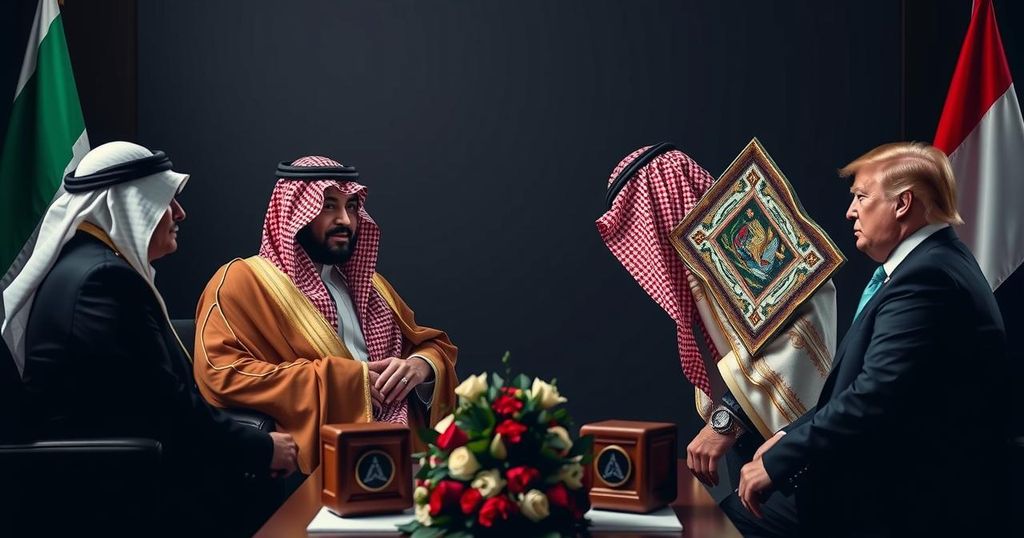Arab leaders congratulated Donald Trump on his election victory, expressing mixed feelings about his capacity to end Middle Eastern conflicts, particularly in Gaza and with Iran. While some leaders are hopeful for peace negotiations, concerns persist regarding potential escalations involving Israel. Analysts predict pressure from Trump to resolve existing conflicts swiftly as his inauguration approaches.
In the wake of Donald Trump’s recent presidential victory, Arab leaders have offered their congratulations, expressing a mix of optimism and skepticism regarding his potential influence in ending ongoing conflicts in the Middle East. Saudi Arabia’s King Salman, Crown Prince Mohammed bin Salman, the leaders of the United Arab Emirates, and Qatar’s Emir Sheikh Tamim bin Hamad have emphasized the importance of strengthening strategic partnerships, noting their hopes for peace. Dania Koleilat Khatib, president of the Research Center for Cooperation and Peace Building in Beirut, remarked to VOA that during his campaign, Trump highlighted his personal relationships with Arab leaders, contrasting them with what she described as President Biden’s more transactional approach. According to Khatib, there exists a pressing desire among Arab leaders for Trump to facilitate the end of clashes, particularly in Gaza and Lebanon, as he had promised during his campaign. Khatib expressed uncertainty about the specifics of peace, stating, “One of his main campaign promises was to end the war in Gaza. But end it how? Would it end with a Palestinian state? We don’t know.” She also raised concerns about potential escalations involving Israeli Prime Minister Benjamin Netanyahu’s stance on Iran, underscoring that managing tensions with the Islamic Republic will be a significant challenge for Trump. Crown Prince Mohammed bin Salman has indicated that Saudi Arabia will not pursue improved relations with Israel until mediation efforts in Gaza result in the establishment of a Palestinian state. Meanwhile, Gulf nations have strengthened ties with Iran, assuring Tehran they would not permit Israeli forces to utilize their airspace for attacks. In response to the election results, Iranian officials have downplayed Trump’s victory, signaling readiness for a confrontational stance against Israel. King Abdullah of Jordan, Egyptian President Abdel Fattah al-Sisi, and Lebanon’s caretaker Prime Minister Najib Makati, who are actively engaged in negotiations to de-escalate regional tensions, also conveyed their congratulations to Trump. Political analyst Osama Al Sharif believes that Trump may exert pressure on Netanyahu to resolve the existing conflicts prior to his inauguration next January, arguing that the ongoing violence, especially in Gaza, has become politically detrimental for the Democratic Party. “Trump doesn’t need to start his first day at the office with more news of children getting killed and hospitals being blown up,” Al Sharif noted. Furthermore, Al Sharif speculated that Trump, an isolationist by nature, might pursue stricter sanctions against Iran and suggested communication with Tehran could occur via Russian President Vladimir Putin, who is aligned with Iranian interests. However, he voiced concerns that Trump might endorse Israel’s annexation of significant portions of the West Bank, an action that would exacerbate existing tensions for both Palestinians and Jordan.
This article addresses the reactions of various Arab leaders to Donald Trump’s election as President of the United States. The leaders have a vested interest in the U.S.’s foreign policy, particularly regarding conflicts in the Middle East, such as those in Gaza and Lebanon, as well as relations with Iran. The discussion also touches upon Trump’s campaign positions and the expectations that Arab leaders have for his administration’s approach towards establishing peace and stability in the region.
In summary, Arab leaders have congratulated Donald Trump following his presidential victory, harboring hopes that he can effectively address ongoing conflicts in the Middle East while navigating complex relations with Iran and Israel. While some remain cautious about the feasibility of achieving a stable peace, others believe pressure on Israeli leadership is necessary to foster resolution. Ultimately, the region’s dynamics remain precarious and require careful handling by the incoming administration.
Original Source: www.voanews.com






